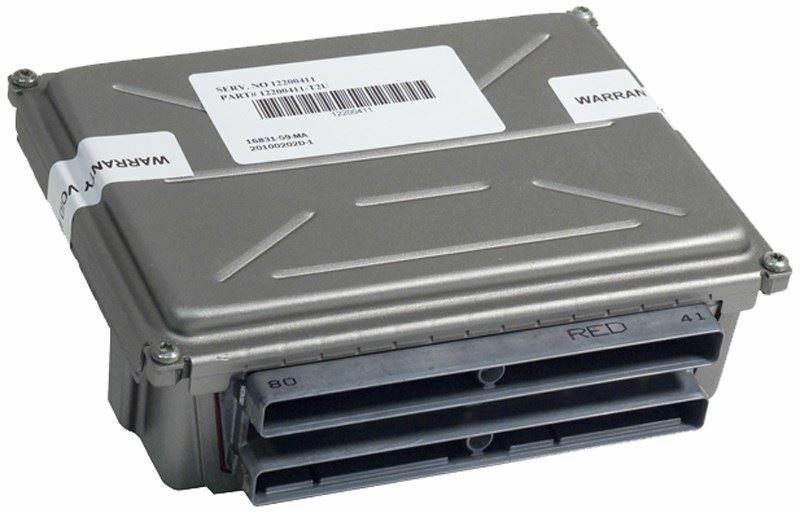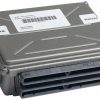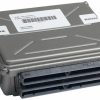Restore Your Vehicle’s Brain and Bring Back its Power
Is your truck or SUV feeling sluggish, unpredictable, or just not right? A failing Powertrain Control Module (PCM) can be the hidden culprit behind a host of frustrating issues, turning your reliable vehicle into a source of daily stress. This isn’t just a component; it’s the central command center for your engine’s performance, fuel efficiency, and emissions. When it falters, everything from starting the engine to shifting gears can be compromised. This replacement PCM, service number 12586242, is the definitive solution to get your vehicle running like new again. We take the guesswork out of the repair by programming it specifically to your vehicle’s VIN with the latest GM software updates before it even leaves our facility. This ensures a seamless integration, restoring the crisp response and dependable operation you’ve been missing.
Signs Your PCM is Failing and Benefits of Replacement
Don’t let a faulty computer keep you off the road. If you’re experiencing any of these symptoms, our pre-programmed 2004 Isuzu Ascender PCM can be the key to a lasting fix.
- ✔ Check Engine Light: An illuminated CEL with communication error codes (like U0100) or a cluster of seemingly unrelated sensor codes (P0300, P0171, P0420) often points to a failing module.
- ✔ Erratic Engine Behavior: Unexplained stalling, rough idling, hesitation during acceleration, or sudden drops in power are classic signs of a PCM struggling to manage engine functions.
- ✔ Poor Fuel Economy: A malfunctioning PCM can’t properly regulate the air-fuel mixture, leading to a noticeable and costly decrease in MPG.
- ✔ No-Start Condition: In severe cases, the PCM may fail to control the ignition or fuel systems, preventing the vehicle from starting at all, leaving you stranded.
- ✔ Transmission Problems: Issues like harsh shifting or failure to shift can sometimes be traced back to the PCM, which communicates directly with the transmission control module.
An Expert’s Note on Diagnostics
I’ve seen countless technicians chase their tails replacing sensors and spark plugs, only to find the root cause was the PCM all along. A common giveaway is when you get multiple, unrelated trouble codes at once. For example, codes for an oxygen sensor, a misfire, and a throttle position sensor appearing together rarely mean all three parts failed simultaneously. It’s often the central computer misinterpreting data. Before you spend hundreds on parts you don’t need, consider the PCM as the potential source of the problem.
Guided Installation to Restore Peace of Mind
Replacing your PCM is a straightforward job you can do with basic hand tools. Follow these steps for a confident installation and get back to a worry-free drive.
- Safety First: Begin by disconnecting the negative terminal from your vehicle’s battery. This prevents any electrical shorts during the installation process.
- Locate the Old PCM: On most compatible vehicles like the Trailblazer, Envoy, and Rainier, the PCM is located in the engine bay, next to the air filter box. On trucks like the Silverado and Sierra, it’s typically found on the driver’s side, under the battery tray.
- Disconnect the Connectors: Carefully unplug the electrical wiring harnesses from the old module. There are usually release tabs that need to be pressed or levers that need to be lifted. Avoid forcing them.
- Remove the Old Module: Unbolt the old PCM from its mounting bracket and remove it from the vehicle.
- Install the New PCM: Mount your new, pre-programmed PCM onto the bracket and secure it. Reconnect the wiring harnesses, ensuring they click firmly into place.
- Reconnect the Battery: Reattach the negative battery terminal and tighten it securely.
- Final Steps: In some cases, your vehicle may require a security or crankshaft position sensor (CASE) relearn procedure. This can often be done with a capable OBD2 scan tool or by a local repair shop. Start the vehicle and let it idle for a few minutes to allow the computer to sync with all the vehicle’s sensors.
Guaranteed Fit for Your GM Truck or SUV
This module is a direct replacement for service number 12586242 and is compatible with a wide range of 2004 GM vehicles. Please verify your service number or contact us with your VIN to confirm compatibility. This part is engineered to fit the following models, among others:
- 2004 Buick Rainier 5.3L
- 2004 Cadillac Escalade, ESV, EXT
- 2004 Chevrolet Avalanche 1500
- 2004 Chevrolet Silverado & Sierra 1500/2500/3500 (Gasoline)
- 2004 Chevrolet SSR
- 2004 Chevrolet Suburban & Yukon XL 1500/2500
- 2004 Chevrolet Tahoe & GMC Yukon
- 2004 Chevrolet Trailblazer EXT 5.3L
- 2004 GMC Envoy XL / XUV 5.3L
- 2004 Hummer H2
- 2004 Isuzu Ascender 5.3L
This module is the correct solution for vehicles requiring service numbers: 12586242, 19299226, 89017738, YFKD, YFKF, YFKH, YFKJ, YFKX, YFXL, YFXM, YFXN, YFXP, or YHTN. Getting the right 2004 Isuzu Ascender PCM is crucial, and we make it easy.
Frequently Asked Questions
Do I need to do anything after I install this PCM?
Because this PCM comes pre-programmed to your VIN, it is typically a plug-and-play installation. However, some GM vehicles may require a security relearn or a Crankshaft Variation (CASE) relearn procedure to sync with your specific vehicle. This can be performed by a qualified mechanic or with a high-end diagnostic scan tool.
How do I provide my VIN number?
After completing your purchase, you can send us a message with your 17-digit Vehicle Identification Number (VIN). We must have this information to program the module correctly before shipping.
Is this a new or used part?
This is a high-quality, OEM-grade replacement part that has been thoroughly inspected and prepared to meet or exceed original factory specifications. It is loaded with the latest software from GM for optimal performance.
Will this fix my transmission shifting problems?
In many cases, yes. The PCM plays a critical role in controlling transmission shift points and line pressure. If your shifting issues are electronic and caused by a faulty module, this replacement part is the correct solution. However, it will not fix internal mechanical failures within the transmission.
What is the difference between an ECM and a PCM?
The terms are often used interchangeably. ECM stands for Engine Control Module, while PCM stands for Powertrain Control Module. A PCM is a more advanced type of ECM that controls both the engine and the transmission functions, which is standard on most modern vehicles like your 2004 GM truck or SUV.


